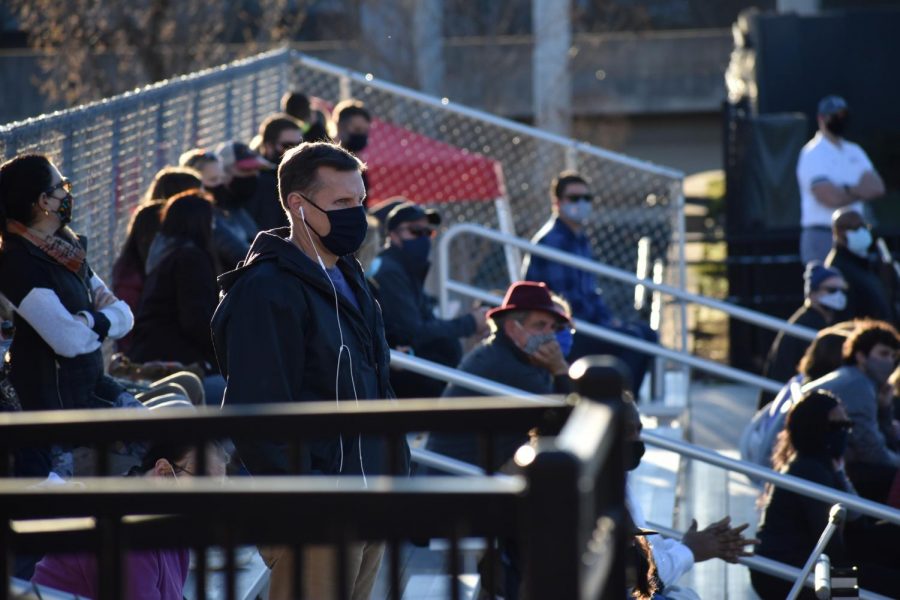APS lifts restriction on spectators at athletic events
Parents and students watch the varsity girls lacrosse game against North Springs on March 3. The Knights won 17-1. As a part of the new restrictions, only 100 spectators are allowed at each event, and masks and temperature checks are required.
March 23, 2021
After restricting fans from attending all fall and winter sporting events, Atlanta Public Schools relaxed its restrictions, allowing spectators at spring sporting events.
The district implemented the full ban on spectators in the fall in an effort to prioritize the health of athletes, coaches and fans.
“The decision was made originally because we were inclined to follow as many Covid-19 protocols and not subject our fans or anyone else to anything with regards to spreading the virus and not being a part of the spread,” APS Director of Athletics Jasper Jewell said. “I was following the lead of the superintendent (Dr. Lisa Herring), and we thought it was best practice that we’re not allowed fans.”
Grady athletic director and boys basketball coach Patrick Johnson said another reason for the ban was the district wanted to ensure that athletics were able to continue.
“I think the mindset behind it was, being in the middle of a pandemic, if we were going to allow athletics, they wanted to make sure that was being done as safely as possible for our student-athletes,” Johnson said. “Not having large crowds of people at those events, especially football games, was part of that calculation and that tradeoff.”
For the athletics community, the lack of spectators was the most notable change to sports during the 2020-2021 school year due to Covid-19.
“Spectators are a huge part of sports, whether you’re playing youth sports, high school, college or pros,” said Johnson, who also played collegiate basketball for the Duke University. “It’s not the most important thing, but it’s definitely an important part of the experience. It’s a big part of athletics, and I’m definitely glad that we’ve been able to bring it back in some form.”
The decision does have its restrictions, including a spectator limit for both Grady Stadium and Walden Athletic Complex, along with a mask and temperature check requirement.
“At Grady Stadium, we want to try to make sure that we’re not [allowing] any more than 30 percent capacity of the stadium,” Johnson said. “Over at Walden, we’re trying to keep it to 100 people per event. Obviously, you’ve got masks required for everybody, temperature checks required upon entry and social distancing, which isn’t too much of a challenge.”
Even with the limitations, the admission of fans at games was a huge step forward for all athletes, especially seniors, said Peggy Edwards, vice president of the Athletic Booster Club. Edwards lobbied the district for the change, and she also has two sons, including a senior, who both play basketball and lacrosse.
“I think it was tremendous,” Edwards said. “Missing [basketball] senior night was tough. Not being there definitely made me want to at least see him play lacrosse. These seniors right now are in such a hard spot. They haven’t walked the halls of Grady since last March. Some normalcy, I think, will help them.”
For players, there’s nothing quite like playing in front of a crowd, so not having one left a void, Aiden Abramowitz, senior boys lacrosse player, said.
“Having fans is important to us as players because it’s extra motivation, and it makes games feel more like games instead of practice,” Abramowitz said. “As a senior, I’m glad that we can have fans because these are all my last high school games, and I would like for my family to be able to come.”
Jewell explains that a big part of why APS decided to allow spectators at events was not only because of players but also parents.
“In my opinion, it was more so around parents, family members and loved ones,” Jewell said. “They had gone long enough and not been able to see their kids participate in sports; so, I felt that once we were able to get the green light from the superintendent, then it would be time to at least usher in a percentage of fans And, hopefully within that percentage of fans, most would be centered towards family members.”
The spectator ban extended throughout the winter and fall seasons, leaving events like Friday night football games, the trademark of the high school experience, without fans.
“I wish the decision would have been made earlier,” Abromawitz said. “Football season is one of the best parts of high school in my opinion, and fall sports didn’t get any fans at all. Even if APS had allowed fans, it wouldn’t have been the same either way because Covid protocols would need to be in place. It was sad, but no one could really do anything about it.”
With more knowledge of Covid-19 and with examples from outside of APS, it seemed best to allow fans in the spring instead of the winter or fall, according to Johnson.
“The surrounding circumstances [in the fall and winter] were even worse than they are now,” Johnson said. “There’s also the issue of indoor sports versus outdoor sports, like basketball and wrestling and swim in the winter versus all outdoor sports in the spring. We’re in a place now where there’s a lot more evidence and examples out there of how this can be done as safely as possible, so I commend the district ultimately for looking at the situation, looking at how other schools and district have been able to do it and things they’ve done right and things they’ve done wrong.”
Abramowitz, who has already attended multiple events since the ban was removed, said the district made the right call.
“I think having the fans at the games is safe,” Abramowitz said. “Everyone is outside and in masks and the viewers are limited; it’s a good idea.”
Ultimately, like Johnson and Abramowitz, Jewell acknowledges the importance of sports and realizes the major role fans play in sports.
“I want kids to have the ultimate edge to the athlete experience,” Jewell said. “I want our fans to have some fun and experience, but not only that, I want them to be able to have the ability to watch their kids participate. So, I felt it was important because fans change the whole complexion of a game. They give the teams that extra incentive to go hard and do their best, and I feel like that’s super important.”
Johnson is pleased to have fans at games again and ultimately thinks the district was correct to lift the ban.
“I definitely support [the decision], and I’ve enjoyed having fans back, I know that,” Johnson said. “I think that the district has made the right calls along the way and has put the safety of our athletes and our coaches first and has also been willing to be flexible and adjust plans when that’s appropriate. So, I’m definitely supportive of the decision to bring spectators back and appreciative that they’ve given us the guidelines and tools to implement that decision. ”







